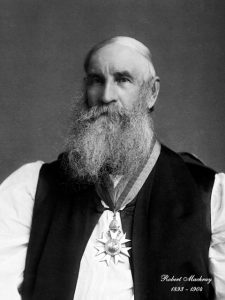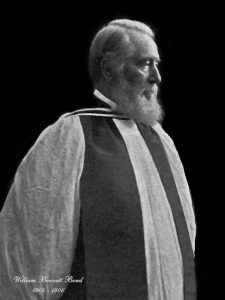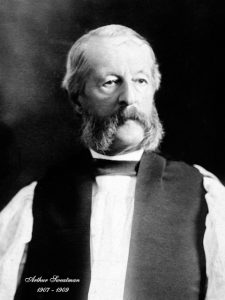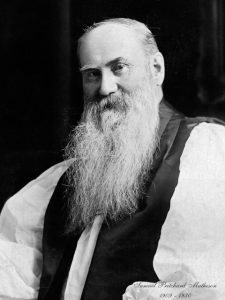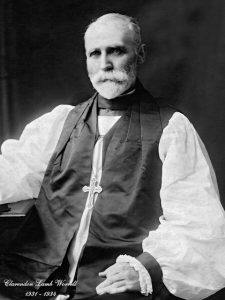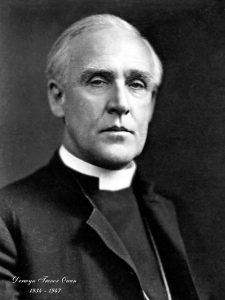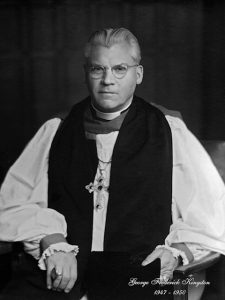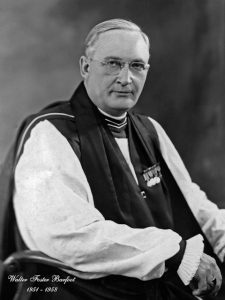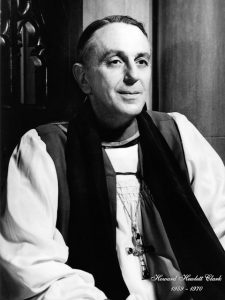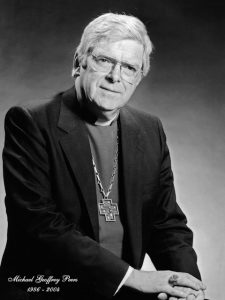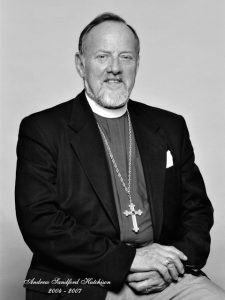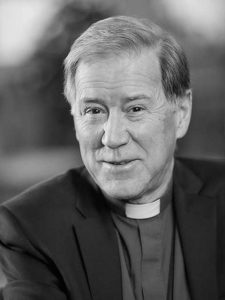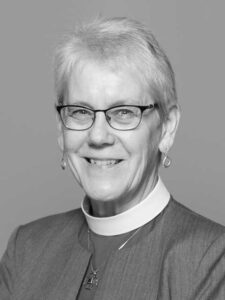Archdeacon Jim Boyles, General Secretary
Our Primary Goal is Justice, Healing and Reconciliation
In 1991, the National Executive Council met in Winnipeg and heard presentations from former residential schools students who spoke movingly of their unhappy and difficult experiences in the schools. Since then, General Synod has been on a course toward seeking justice and healing of those whose lives were damaged. That same meeting authorized the establishment of the national Healing Fund. In 1993, Archbishop Peers delivered a heartfelt apology to those attending the National Native Convocation in Minaki, Ontario.
Last year, General Synod adopted as a priority an extensive plan committing the Church to a new and active partnership with Indigenous Peoples. Known as A New Agape, this Plan of Anglican Work in Support of a New Partnership Between Indigenous and Non-Indigenous Anglicans is based on a relationship that stresses the cultural, spiritual, social and economic independence of indigenous communities. It focuses on five goals: self-determination, justice, healing, historical reparation, and walking in partnership. This fall, information kits will be distributed to parishes with resources to help them implement A New Agape locally.
Our primary goal continues to be healing and reconciliation:
Survival and Beyond: Hope, Help and Healing
In early July, approximately two hundred residential school ‘survivors’ attended this conference on the campus of the University of British Columbia. Sponsored by the Indian Residential School Survivors Society, this 4-day event featured over 100 workshops and sessions. One of the sessions featured a panel that included Phil Fontaine, former Grand Chief of the Assembly of First Nations, Jack Stagg, Deputy Minister of the Office of Indian Residential Schools Resolution and Donna Bomberry, Coordinator for Indigenous Ministries at the Anglican National Office. Expressing regret for the slow pace in resolving claims, Stagg said, “Elders we know who were abused as children deserve to have their stories heard and to share their experiences before it’s too late for them to do so.” Fontaine observed, “There is not as much anger now. People have come to grips with the situation and realize they must now move beyond anger and rage.” He also criticized the churches: “As for the churches, as soon as they get off this play that this thing is going to bankrupt them, the better off we will be. They have to get on with the job of working with government and the survivors.”
Bomberry, speaking only as a member of the Anglican Church, stated that an agreement with government is necessary for our work in communities in Canada to continue as partners in the healing that we all seek, and continue to be advocates of justice for Indigenous Peoples as outlined in our strategic plan called A New Agape.
The Anglican Healing Fund provided a grant for this event.
First Sacred Circle, Diocese of Rupert’s Land
The Indigenous Council of the Diocese of Rupert’s Land sponsored a diocesan Sacred Circle in late June. Approximately 200 people of all ages, both indigenous and non-indigenous, gathered in Dynevor, MB. There were presentations of the history of the Peguis people. Bishop Don Phillips offered a sincere apology. Then followed a feast, small sharing circles and a concluding Eucharist. The Reverend Murray Still, an indigenous priest in the diocese and one of the organizers of the Sacred Circle, commented, “Indigenous Anglicans in Rupert’s Land look forward to taking a leadership role. We are grateful for the voice we are discovering, and pray that true healing and reconciliation will come”.
The Sacred Circle is a gathering of people into the circle of community that is a sacred space. Some basic values of the circle are: sharing, gift, respect, equality and sacredness. It is a place of affirmation, nurture, acceptance, safety and wholeness.
Traveling National Archives Exhibition: Where are the children? Healing the legacy of the residential schools
The National Archives, in cooperation with the Aboriginal Healing Foundation, the General Synod Archives and the archives of other churches, has mounted a photographic exhibit on the history of the residential schools. Her Excellency the Right Honourable Adrienne Clarkson, Governor General of Canada, officially opened the exhibit in Ottawa in June. Speakers included: the Primate, Archbishop Peers, Matthew Coon Come, Grand Chief of the Assembly of First Nations, and Jack Stagg, Deputy Minister of the Office of Indian Residential Schools Resolution. Archbishop Peers stated, “Learning from our involvement in the schools has been costly. Given that cost, for Aboriginal Canadians and for churches, it is crucial to learn this lesson only once, to learn it well and to move forward in a way that brings us to healing and trust.”
The exhibit is at the National Archives Building in Ottawa until February 2003. A parallel exhibit will be traveling to several Canadian cities in the coming months.
A Just and Effective Alternative Dispute Resolution Process
The federal government is now facing more than 11,000 claims from former residential schools students, and to date only about 530 cases have been settled, mostly through pre-trial settlements or alternative dispute resolution (ADR) processes. Given this large number of claims and the typically slow pace at which litigation unfolds, the government and the churches who are listed as co-defendants in many of these claims have said they are committed to working with Indigenous Peoples and leaders in designing a just, safe, compassionate, effective and efficient ADR process that could be made available to claimants. The process would enable claims to be resolved justly and expeditiously while maintaining high standards for validation of the claims. Representatives of the churches and government have been meeting with an aboriginal working caucus over the last several months to work on such design. In related developments, legal representatives of church and government are also involved in discussions with counsel for the claimants in Saskatchewan, Manitoba and Ontario with the aim of developing a workable ADR process that would be made available to claimants should they chose this route.
Insistence on a serious validation process
All participants in the working caucus are committed to a serious review of each claim to ensure that it is valid, and that allegations of abuse by former staff are explored in a just and honest manner.
General Synod believes that an ADR approach can provide opportunities for addressing claims in a way that is less traumatic for claimants and provides some hope for restorative justice. While ADR settlements are not likely to be less expensive than litigation, the ADR process typically provides for speedier resolution of claims and avoids the harsh, adversarial setting of the courtroom. General Synod is committed to pursuing alternatives to litigation where possible, acting justly in litigation, and continuing to work for reconciliation among First Nations and non-aboriginal Canadians.
While General Synod is supportive of an ADR process as a substitute for litigation, it continues to have some concerns related to this approach. In particular, it is concerned that its resources be used to benefit survivors rather than have these used up in paying for ADR process costs, which can be considerable. The government has insisted that the churches contribute 30% of the costs of ADR processes. The church is concerned that it cannot meet these costs within its existing financial resources.
Negotiations with Government
Significant progress has been made since January, when government and Anglican representatives began bi-lateral negotiations over residential schools liability. In the 11 sessions that have taken place, there has been resolution on many aspects of an eventual draft agreement. (Any draft agreement reached by the negotiators would be forwarded for approval to the Officers of General Synod and the 11 dioceses named in the litigation; also, all dioceses would be approached for their support.) However, there are still a limited number of difficult issues that remain unresolved. At this stage, legal counsel for both sides are working on possible solutions. It is clear from the progress that has been made that both parties want an agreement, as it would facilitate resolution of claims.
From an Anglican perspective, an agreement would mean that funds would be directed to survivors of abuse rather than being used up for legal costs. In addition, it would facilitate the work of healing and reconciliation which continues to be our primary goal. As well, it would move us closer to more positive relations between the church and First Nations.
Without an agreement, General Synod may face extinction and there will be a need for a new national expression for Canadians of the Anglican faith. For dioceses across the country, both for those named as defendants and those that aren’t, the impact would likely be several years of chaos until such a new national expression was stabilized. Failure to reach an agreement also means that the church will have lost an important opportunity to address past harms and injustices.
While there is definitely a sense of urgency for the church and government to reach agreement, the Anglican negotiating team remains steadfast in its resolve that any draft agreement reached must be just and humane for residential school survivors and allow for the long-term viability of General Synod and the dioceses in fulfilling their mission.
Implications of Possible Agreement with the Government
If we are able to reach agreement, here are some of the implications for us:
Settlement funds will reach victims of abuse, and will not be used for our legal costs
One of the major concerns is that the present litigation process means that the legal process consumes most of our resources, with little if any actually available for those who suffered abuse. One survey a year ago indicated that less than 2% of amounts expended by dioceses and General Synod on the residential schools issue had reached victims.
A draft agreement reached by the negotiators will be subject to the approval of the General Synod Officers, the Officers of the Missionary Society and those dioceses facing litigation. Other dioceses will need to indicate their support.
Some consultations have been held with dioceses and members of the negotiating team in the past month or so, and others are planned. Once an agreement is reached, there will be intensive consultation with all dioceses in an attempt to secure their support. Members of the negotiating team include: Archbishop David Crawley, Archdeacon Jim Boyles, Archdeacon Larry Beardy, Jim Cullen, General Synod Treasurer, and lawyers Bob Falby, Jerome Slavik, John Page and Peter Whitmore.
All dioceses involved, those facing litigation and those not, will be asked to participate with financial contributions
General Synod, the Missionary Society and dioceses will be requested, and expected, to contribute and assist in resolving the issue and stemming the drain on finances caused by litigation costs in eleven dioceses as well as in General Synod. As yet, the amount has not been determined.
Administration of a Settlement Fund will be in the hands of an Anglican body
Anglicans will make payments directly to Indigenous Peoples whose claims have been validated. This is not ‘paying the government’.
There will be an acknowledgement of our participation in, and responsibility for, operation of the residential schools
Although there are many complexities, Anglican bodies were involved in the operation of approximately 26 schools up until 1969. The courts have reached different decisions as to the church’s proportion of responsibility, and the government has unilaterally decided that the church’s proportion is 30%. There may be further debate on this decision, but it is unlikely that our responsibility will be found to be zero.
Claims of sexual and physical abuse will be processed first
The government hopes to resolve the vast majority of these claims by alternative dispute mechanisms or in pre-trial settlements. Only a few may actually reach court. Sexual and physical abuse are provable ’causes of action’ and can be determined on the facts.
Claims solely for loss of culture and language will be subject to court decision
These claims are not at present recognized ’causes of action’ and both church and government do not think they should be for a variety of legal reasons. The church’s position is that the loss of culture and language is to be deplored, and needs to be remedied through a programmatic response.
Government and church are committed to programmatic responses to claims relating to loss of culture and language
The government, through several existing programs, provides funds for recovery of language and culture. The Anglican Healing Fund has also made grants for these purposes. The government has indicated that it is reviewing its programs in these areas and is considering expanding them.
If No Agreement is reached with the Government
If we are not able to reach an agreement, General Synod and several dioceses may not be able to survive. Here are some of the implications for us:
Ongoing litigation
Eleven dioceses and General Synod will remain in litigation with ongoing legal and research costs, spreading over many years. There are several trials now scheduled for 2003, and at least one for the fall of 2002.
Minimal or no participation in ADRs
It will continue to be difficult for General Synod and the dioceses to participate in these processes since the government expects us to contribute 30% of quite large process costs, as well as 30% of any awards. Our policy at the moment is to make no commitment to such contributions and therefore we do not participate. We are, however, willing to have an observer present if requested by the claimants, and we have offered to meet with those whose claims have been validated to consider whether a contribution is possible.
Increasing tension between church, government and Aboriginal Peoples
No agreement means that resolution will be much more difficult and slow. Some claimants may settle for 70% paid by government and not pursue the churches further. Others may refuse to settle unless the church’s 30% is available. There will be continued hard feelings and the church will be perceived as shirking its responsibility.
Current Number of Claims
There has been some confusion as to the numbers of claims facing the Anglican bodies. In Update #10 of June, 2001 we reported 1195 claims, of which one-third resulted from government action in naming General Synod as a third party. As of March 2002, the number of claimants has risen to 1350. Approximately one-third are the result of government third party action. The government has also indicated that it has on hand another few hundred claims received since last July. In most of these cases it has deferred naming the Anglican bodies as third parties, pending the outcome of the negotiations.
In only one case has a diocese been named in claims but not General Synod, and those claims involve the Mohawk Institute in Brantford, Ontario, in the Diocese of Huron. The New England Company, a missionary society in England, originally owned this school, but the Company entered into an agreement with the government in about 1927 under which the government operated the school and agreed that it would continue to have an Anglican identity. The Missionary Society of General Synod had no involvement, and it seems that the Diocese also had no involvement, although it continues to be named as a defendant.
Financial Update on General Synod
For the first six months of 2002, General Synod’s legal and research costs related to residential schools were $596,000. We continue to draw these funds from our assets while ongoing contributions from dioceses are used for ongoing programs. By the end of the year, the available assets will have diminished significantly, and the Council of General Synod in November will have to assess the situation as they face a decision about the 2003 budget.
The dioceses facing litigation are in the same position, spending on litigation while attempting to maintain ongoing work. For some of them, it will be a challenge to maintain their General Synod contribution at previous levels. To date, however, the dioceses are meeting their commitments for 2002, and indeed remittances are running ahead of previous years.
Litigation Update
The residential schools claims are very slowly making their way through the legal system. There is one trial scheduled for Saskatchewan in November, and a few scheduled for 2003. Of particular interest are two actions in which we are involved:
Calgary Motion
In May, the Dioceses of Calgary and Athabasca and General Synod asked the court to remove them from litigation in Alberta, claiming that the only legal corporation involved in residential school work was the Missionary Society (MSCC). A decision has not been issued yet.
Mowatt Appeal
The BC Court of Appeal has set January 20, 2003 to hear five appeals all related to residential schools, including the Mowatt case involving St. Georges school, Lytton BC.
Contingency Planning
While the expectation is that General Synod and the dioceses will be able to reach an equitable and workable agreement with the government, General Synod has also been developing contingency plans in case one is not achieved. These plans focus on how important programs and services may be provided to the whole church, should General Synod itself cease to exist.
Ecumenical Work
Though the ecumenical group that had represented the four churches in residential school negotiations with the government disbanded in January, representatives from the churches have stayed in touch and consulted from time to time. The Roman Catholic coordinating committee that had been negotiating on behalf of 33 Roman Catholic organizations named in litigation, has since disbanded and advised the government to be in touch directly with each of their organizations.
National Day of Healing and Reconciliation, August 5, 2002
An initiative of some aboriginal people, this day has been selected to highlight the needs and opportunities for healing and reconciliation both in aboriginal communities and beyond. Their website, http://ndhrcanada.visions.ab.ca/index.htm concludes with this call: “Join us to heal the past and create a stronger future for all of Canada.”
First Nations Governance Act
On June 14, 2002, Indian Affairs Minister Robert Nault tabled Bill C-61, commonly referred to as The First Nations Governance Act. It has met with strong opposition from Indigenous Peoples who see the legislation as threatening their struggle for self-governance, autonomy and self-determination. The Anglican Council of Indigenous Peoples, with the support of General Synod, plans to continue its advocacy efforts in opposition to this legislation.
-o0o-
For further information, kindly contact Archdeacon Jim Boyles at [email protected] or 416-924-9199 ext 280.
Distributed to:
- Archbishops and Bishops
- Members of Council of General Synod
- Members of Anglican Council of Indigenous Peoples
- Chairs of committees
- General Synod staff
- Posted to www.anglican.ca
- Enclosed with MinistryMatters
Key to abbreviations: U = university or college; T = theological college; R = residence; D = distance education; I = indigenous education.
Principal: Rev. Joey Royal
Box 11349
Iqaluit NU X0A 1H0
Tel: (867) 979-6307
Email: [email protected]
President: Rev. Canon Neale Bennet
660 Francklyn Street
Halifax NS B3H 3B5
Tel: (902) 423-5592
Fax: (902) 492-4048
More contact information
Registrar & General Secretary: Yves Jodoin
Lennoxville QC
J1M 1Z7
Tel: (819) 822-9600 ext. 2676
Fax: (819) 822-9661
E-mail: [email protected]
Principal: Dr. Gordon Drake
2500 University Avenue West
Windsor, Ont. N9B 3Y1
Tel: (519) 971-3646
E-mail: [email protected]
Principal: Michelle Owens
Woodsworth House
60 Maryland Street
Winnipeg, Man. R3G 1K7
Tel: (204) 783-4490
Fax: (204) 786-3012
E-mail: [email protected]
Principal: Rev. Dr. Iain Luke
114 Seminary Crescent
Saskatoon, Sask. S7N 0X3
Tel: (306) 975-3753
Fax: (306) 934-2683
E-mail: [email protected]
Coordinator: Rev. Dr. Kara Mandryk
403 Larose Avenue
Box 2518
The Pas, MB
R9A 1M3
Tel: (204) 623-3311
Fax: 1-888-519-3137
E-mail: [email protected]
Principal: Dr. Barry Craig
1349 Western Road
London ON
N6G 1H3
Tel: (519) 438-7224 x233
Fax: (519) 438-3938
E-mail: [email protected]
Principal: Ven. Dr. Michael E. Averyt
1308 5th Avenue East
Prince Albert SK S6V 2H7
Tel: (306) 763-2455
Fax: (306) 764-5172
E-mail: [email protected]
Principal: The Rev. Dr. Jesse A. Zink
3475 University
Montreal QC
H3A 2A8
Tel: (514) 849-3004
Fax: (514) 849-4113
E-mail: [email protected]
Provost: Rev. Dr. Rick Singleton
210 Prince Philip Drive, Room 3000
St. John’s NL
A1B 3R6
Tel: (709) 753-0116 or 1-877-753-0116
Fax: (709) 753-1214
E-mail: [email protected]
Principal and Vice-Chancellor: The Rev. Canon Dr. Wendy Fletcher
240 Westmount Road North
Waterloo ON
N2L 3G4
Tel: (519) 884-4400
Fax: (519) 884-5135
E-mail: [email protected]
Warden: Dr. Allison Abra
92 Dysart Road
University of Manitoba
Winnipeg MB
R3T 2M5
Tel: (204) 474-8531 or 1-800-432-1960
Fax: (204) 474-7610
E-mail: [email protected]
Program Director: The Rev. Dr. Kevin Flynn
Anglican Studies
Faculty of Theology
Saint Paul University
223 Main Street
Ottawa ON K1S 1C4
Tel: (613) 236-1393 ext. 2427
Fax: (613) 751-4016
E-mail: [email protected]
President and Vice-Chancellor: Rev. Dr. Robert Derrenbacker
935 Ramsey Lake Road
Sudbury ON
P3E 2C6
Tel: (705) 673-1730 or 1-866-846-7635
Fax: (705) 673-4979
E-mail:[email protected]
Director: Rev. Canon Dr. Alan Hayes
47 Queen’s Park Crescent East
Toronto ON
M5S 2C3
Tel: (416) 978-4039
Fax: (416) 978-7821
E-mail: [email protected]
Provost: Dr. Mayo Moran
Dean of Divinity: Rev. Dr. Christopher Brittain
6 Hoskin Avenue
Toronto ON M5S 1H8
Tel: (416) 978-2133
Fax: (416) 978-4949
E-mail: [email protected]
President: Dr. William Lahey
6350 Coburg Road
Halifax NS B3H 2A1
Tel: (902) 422-1271
Fax: (902) 423-3357
E-mail: [email protected]
Principal: The Rev. Dr. Richard Topping
6015 Walter Gage Rd
Vancouver BC V6T 1Z1
Tel: (604) 822-9031 or 1-866-822-9031
E-mail: [email protected]
Principal: Rt. Rev. Dr. Stephen Andrews
5 Hoskin Avenue
Toronto ON
M5S 1H7
Tel: (416) 946-3535
Fax: (416) 946-3545
E-mail: [email protected]

In 1969, the church ended a century of running residential schools. It also committed to a new relationship with Indigenous peoples, heeding Charles Hendry’s call (Beyond Traplines), for a partnership based on solidarity, equality and mutual respect.
Since that turning point, the church has slowly grown into its solidarity role, supporting our political struggles for self-determination, recognition of treaty and land rights, and respect for Mother Earth.
For 47 years we have had Indigenous staff at the national office. Our council has found its voice and strength, and become the Anglican Council of Indigenous Peoples. Since 1989, fourteen Indigenous bishops have been elected; 10 First Nations, 3 Inuk and two Métis. Six are now retired; they are Charles Arthurson, Gordon Beardy, Benjamin Arreak, Andrew Atagoaaluk, Thomas Corston and Paul Idlout.
In 1994 and in 1997, we responded joyfully to God’s sacred call and covenanted together to work for self-determination within the church. That New Covenant was accepted by the Anglican General Synod.
Through three national convocations (1988, 1993, and 1997) we reclaimed our identity as Indigenous Anglicans, and began to share and heal our pain from the residential schools. In 1993 we accepted from the Primate, Archbishop Michael Peers, an apology from the church for the residential-school system. Since 2000, five national Sacred Circles have been held with focus on healing, moving toward self – determination, finding and sharing our Indigenous voice and developing a true partnership with the Anglican Church of Canada.
In a March of 2003, leaders of the Anglican Church from across Canada and Federal officials ratified an agreement that detailed the payment of compensation to victims with valid claims of sexual and physical abuse at Anglican-run residential schools. The All – Parties Settlement Agreement came later in 2005.
Also, in August of 2005, The Sacred Circle issued the Pinawa Declaration:
Given the crisis in our communities and to insure the survival of Anglicanism in our territories, we call for the election and consecration of 15 aboriginal bishops within one year. These missionary bishops will be based in major southern cities and in the north. Each bishop is to be elected in a region. Each bishop will be supported spiritually and monetarily by aboriginal people, sharing justly in the historic, invested wealth of The Anglican Church of Canada. These bishops will be full Anglican bishops treated as equals of non-aboriginal bishops. They are to be welcoming of aboriginal traditions, teachings, and ceremonies.
The Anglican Council of Indigenous Peoples began the search for the National Indigenous Anglican Bishop (NIAB) in 2005. After several interviews, The Rt. Rev. Mark MacDonald (Wendat) was called to be the first NIAB. He started this ministry in the spring of 2007 and was installed at the General Synod of 2007 in Winnipeg. The Elder’s of Indigenous Ministry gave him five charges:
- To speak for Indigenous Anglican People in the Councils of the Church
- To interpret what the Councils of the Church are saying to Indigenous people
- To be a spokesperson for Mother Earth
- To act as a midwife for a self-determining Indigenous Church
- To represent the authority of Indigenous identity with in the Anglican Church of Canada
The Rev. Barbara Andrews (Enoch Cree) was elected Bishop of the Anglican Parishes of the Central Interior, now Territory of the People, in June of 2009.
“In what was described as an ‘historic moment’, the General Synod of the Anglican Church of Canada has approved the introduction of a new canon (church law) that firmly established a self-determining national indigenous ministry within the church. The resolution to establish Canon 22 was passed at General Synod 2010 in Halifax.
In March of 2010, The Ven. Lydia Mamakwa (Oji – Cree) was elected Bishop for the area mission of Northern Ontario.
Bishop Lydia Mamakwa and Bishop Mark MacDonald worked together to establish the Spiritual Ministry of Mishamikoweesh, a new diocese in the Anglican Church of Canada. This was approved by General Synod in 2013 and Lydia was installed as the first bishop in June of 2014.
In 2012, the Ven. Adam Halkett (Cree), was elected area bishop of Missinipi (Northern Saskatchewan).
At the General Synod of 2013, Canon 22 as amended, was also passed. This Canon solidified the Office of the National Indigenous Anglican Bishop and the ministry toward Indigenous self-determination.
In the fall of 2014, the Indigenous House of Bishop’s Leadership Circle issued the statement, “Where We Are Today: Twenty Years after the Covenant, an Indigenous Call to Church Leadership.” The statement was presented and accepted at the 8thSacred Circle, “Lifted on Wings of Faith: Heeding the Indigenous Call,” in Port Elgin, Ontario.
The 8thSacred Circle in the summer of 2015, agreed to move forward with self – determination and endorsed the idea of a Fifth province or an equivalent within the Anglican Church of Canada. Sacred Circle asked the Anglican Council of Indigenous Peoples, the Leadership Circle, and the Office of the National Indigenous Anglican Bishop to take this work forward. A Focus Group was appointed to undertake a number of tasks, including but not limited to:
- Begin small, use the model of Confederacy as outlined by Ginny; separate the Office of the NIAB from Programs of Church House. The Confederacy model develops at least three Indigenous regional area missions, with bishops and funds to support the ministry.
- Speak to Harry Huskins regarding incorporation.
- Work with a consultant for fundraising.
- Focus on ministry to the poor, the crippled, the lame, and the blind. Luke 14:12-14
- Further define the ‘roles and duties’ of the NIAB.
- Develop a Regional Model that has both Indigenous Community and Urban ministry.
- Develop a financial plan to expand the office of the NIAB, to include an Archdeacon, programs funding and staff.
- Develop Financial Management for capital and O&M, business plans for regions and for the national. The church is based on First Nation Sovereignty and Treaty Rights.
In December of 2016 the Corn Soup Meeting report was issued to The Focus Group for review and discussion. This report identified several points that needed to be considered as we move forward.
In March of 2017, The Corn Soup II document was issued to The Focus Group for review and discussion. This document identified priorities for the journey and set forth a budget to fully fund three regional offices.
Both were presented to ACIP for review, discussion and acceptance.
At the General Synod of 2016, Primate Fred Hiltz called for a national consultation on Indigenous ministry self – determination. In September of 2017 the consultation, “The Road to Warm Springs” was held in Pinawa, Manitoba.
The Rev. Riscylla Walsh – Shaw (Métis) was elected bishop for the Trent – Durham district, Diocese of Toronto in 2017.
In 2017, The Ven. Sidney Black (Blackfoot) was elected bishop in the Diocese of Calgary.
In 2017, The NIAB and leadership of Northern Manitoba, inspired by the “Road to Warm Springs” consultation on self – determination, resumed discussion and planning for an area mission and election of another Indigenous Bishop.
Most recently, the Rupertsland Provincial Synod unanimously approved the election of two Indigenous bishops, one for Northern Manitoba and one for Northern Ontario.
In the summer of 2018 the 9thSacred Circle, “Making and Strengthening Disciples: Reborn by Water and Spirit,” University of Northern British Columbia, Prince George, BC. The Statement, “An Indigenous Spiritual Movement, Becoming what God Intends us to Be” was presented.
On September 24, 2018, the Ven. Isaiah “Larry” Beardy (Cree) was ordained and consecrated as the first bishop of Northern Manitoba in the Indigenous Spiritual Movement of Mishamikoweesh.
On October 12, 2018, the Rev. Geoff Woodcroft (Métis) was ordained and consecrated as the Bishop Coadjutor for the Diocese of Rupert’s Land. He became Bishop of Rupert’s Land January 5, 2019.
The Rev. Chris Harper (Cree) was ordained and consecrated Bishop of Saskatoon on November 18, 2018.
During the Arctic Synod, March 28-31, 2019, the Rev. Annie Ittoshat (Inuk), the Rev. Lucy Nester (Inuk) and the Rev. Joey Royal (Métis) were elected and consecrated suffragan bishops for the Diocese of the Arctic.
The Anglican Council of Indigenous Peoples and other Indigenous leaders are committed to further planning and discussion to restore the Circle with the self-determination vision of the Elder’s; to become and a fully Indigenous Church within the Anglican Church of Canada and walk together in partnership.
Staff Contact: Eileen Scully, Director, Faith, Worship, and Ministry [email protected]
Resources and Publications
List of Bible Versions Approved by the House of Bishops for use in Public Worship in the Anglican Church of Canada
Most recent change: 1991, with addition of New Revised Standard Version and the Revised English Bible.
Liturgy and Anglican Identity
A resource to encourage reflection on diversity and unity in Anglican worship. Initially developed by the International Anglican Liturgical Consultation, it now contains a study guide that is useful for parish discussion groups, to assist them in reflecting on their worship lives as a community. It is particularly helpful for thinking cross-culturally and multiculturally within communities.
Make Preparation: Liturgy Planning Notes. Authored by Paul Gibson as liturgical officer of the Anglican Church of Canada, he contributed significantly to the development of the Book of Alternative Services and Common Praise.
Reflections on Anglican Church of Canada Authorized Versions of the Bible
Reflections on the Bible as a ‘translation’ book, with particular attention to the English translations that have been authorized for use for public worship in the Anglican Church of Canada, and is offered for reflection.
Thinking about worship
A list of various resources to deepen your reflection on and practice of Anglican worship.
Worship Resources
Liturgical texts, calendar additions, lectionaries, seasonal and special occasion resources and indigenous liturgical resources.
Task Forces and Committees
Liturgy Task Force
The Liturgy Task Force was mandated by the General Synod 2010 to work on the revision of all contemporary language liturgical texts of the Anglican Church of Canada. The Principles for Liturgical Revision guiding their long-term work were approved by General Synod 2010 at the request of the General Synod 2007. View the rationale for liturgical revision.

